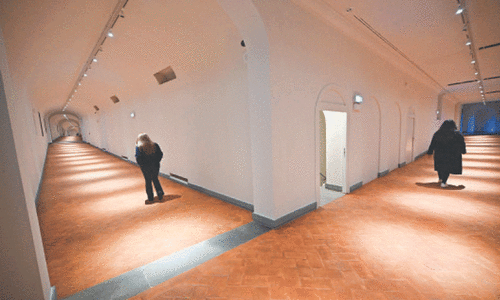ISTANBUL: Turkey's controversial move towards European Union membership has drawn strong opposition within several member states, but a bigger obstacle now emerges by way of a tiny new member of the club: Cyprus.
The island nation has the power to veto the beginning of accession talks with Turkey at the meeting of European Union (EU) leaders on Dec 17, and end Muslim Turkey's 40-year European dream. And it can block that move any time during years-long negotiations even if they begin.
Cyprus President Tassos Papadopoulos has said the country may use the veto power unless Turkey makes moves to recognise the Greek Cyprus in the south, and not just the Turkish north of the island.
"Turkey has obligations toward the EU and the Republic of Cyprus which it must fulfill," Tassos Papadopoulos said. "This does not mean we will exercise a veto; it does not mean we won't exercise a veto." But he added: "When a small country exercises a veto, it causes many difficulties, so it is very difficult to make such a decision."
Turkey, which finds itself in the odd position of not recognising one of the members of the club it aspires to join, has announced it has no immediate plans to recognise the Greek southern part of Cyprus.
Once a united republic, Cyprus has been divided between Greek and Turkish sectors after Turkey intervened militarily and took the northern third of the island in 1974 in response to a Greek-inspired coup bent on uniting the island with Greece.
In a survey, 62 per cent of Greek Cypriots said they want Papadopoulos to veto Turkey's accession move. Turkey's bid is publicly supported by big EU powers like Britain, Italy and Germany.
Turkish leaders expect the EU summit to produce a definite date to start negotiations next year on the basis of a generally favourable report from the European Commission, the executive arm of the EU, that Turkey has met the criteria to start talks despite some shortcomings in implementing legislated reforms on human rights and the rule of law.
Turkish Prime Minister Recep Tayyib Erdogan portrays Turkey's accession as a meeting of civilisations, not a 'clash'. He has also warned that exclusion would signify that Turkey is being denied entry on cultural and religious grounds.
Opponents of Turkish membership, led by former French president Valery Giscard d'Estaing who headed the panel that wrote the draft new EU constitution, speak openly of Turkey's cultural and geographical distance from the rest of EU.
Others, mainly conservatives in Germany, say Turkey is too big (70 million), too poor (current economic output is 27 per cent of the EU average) and too Muslim (98 per cent). Nicholas Sarkozy, new head of the ruling French party, is also opposed to Turkey's full membership.
Turkey's long and winding road to membership could easily become mission impossible and collapse in a proposed referendum in France, or in any other member state.
Turkey rejects the idea of a "privileged relationship" in lieu of full membership as proposed by its opponents in France and Germany. Turkish commentators envisage a Turkey forming a closer alliance with the United States, Russia, Iran or the Arab world if denied EU admission.
Turkey's opponents express fears of mass migration of Turkish labour to a Europe still trying to come to terms with a Turkish population in the EU, more than two million in Germany. Turks and their supporters in Europe say EU has an ageing population and will need additional workforce.
The Cyprus impasse is not an official pre-condition to EU-Turkey accession talks, but it is still a dominating theme. "Okay, we cave in on Cyprus, but will that guarantee EU membership?" asks a man on the main Istiklal Avenue in Istanbul, a sprawling metropolis of 12 million.
As a sign that it is both Europe and Asia, women come to the street in mini-skirts and also in veils. If the EU is pondering whether Turkey belongs to Europe, Turks, too, are engaged in deep debate where they belong.
The population of Turkey is overwhelmingly Muslim but it is secular in its Constitution. Although governed by an Islamic-rooted conservative party, its parliament passed a slew of reforms in what many call "The Silent Revolution".
Much to the dismay of Islam-oriented groups, the Turkish government bans headscarves at schools and in public institutions. Turkish society has for centuries been based on human duties rather than human rights.
Many Turks view Europe's push for the rights of minorities in Turkey, and an effective end to mistreatment by police with the suspicion that the EU is targeting the country's strong national identity and traditions. -Dawn/The Inter Press News Service.














































Dear visitor, the comments section is undergoing an overhaul and will return soon.